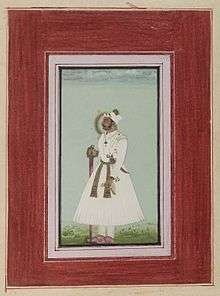Vir Singh Deo

Vir Singh Deo (first name also spelled Bir, last name also spelled Dev, and also known as Bir Singh Bundela) was a Bundela Rajput chief and the ruler of the kingdom of Orchha. He was a vassal of the Mughal Empire.[1] and ruled between 1605 and either 1626[2] or 1627.[3] Vir Singh Deo assassinated Abul Fazl who was returning from Deccan in a plot contrived by the Mughal prince Salim. According to Aruna, he is " the most famous and most powerful of all the Orchha Chiefs. A man of dashing personality, a great warrior and no scruples, a bold and organised administrator".[4]
Abul Fazl was assassinated while he was returning from the Deccan by Vir Singh Bundela between Sarai Vir and Antri (near Narwar) in a plot contrived by the Mughal Prince Salim.
Deo was among the Rajput rulers of his era who sponsored temples in the Brajmandal area that comprised Vrindavan and Mathura.[5] In addition, the Phool Bagh gardens, the Jahangir Mahal and the Lakshmi temple were all built by Deo, whose son, Jhujhar Singh, succeeded him to the throne. His mausoleum is located in Orchha, and features both Hindu and Mughal architecture.
Deo was patron to the poet Keshavdas, who wrote the 1607 hagiographic work Virsimdevcarit (Deeds of Vir Singh Deo).[6]
References
- ↑ Mehta, Jaswant Lal (2005). Advanced Study in the History of Modern India 1707-1813. Sterling Publishers. p. 105. ISBN 978-1-93270-554-6.
- ↑ Michael, Thomas (2009). Cuhaj, George S., ed. Standard Catalog of World Coins, 1801-1900 (6th ed.). Krause Publications. p. 728. ISBN 978-1-44022-801-8.
- ↑ "Fort and Palace at Orchha". British Library. Retrieved 26 March 2015.
- ↑ Aruna (2002). Orchha Paintings. Sharada Pub. House. p. 6. ISBN 978-8-18561-669-8.
- ↑ Busch, Allison (2011). Poetry of Kings: The Classical Hindi Literature of Mughal India. Oxford University Press. p. 7. ISBN 978-0-19976-592-8.
- ↑ Busch, Allison (2011). Poetry of Kings: The Classical Hindi Literature of Mughal India. Oxford University Press. pp. 45–46. ISBN 978-0-19976-592-8.